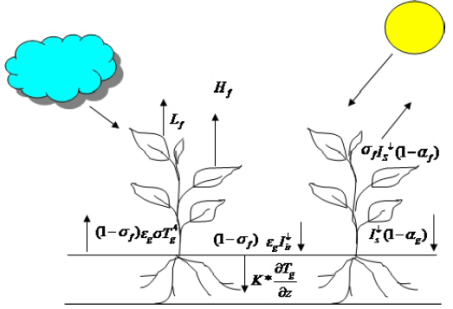From A green roof model for building energy simulation programs, D.J. Sailor, Portland State University:
A green roof (aka ecoroof or vegetated roof) is a roof that contains a soil (growing media) and vegetation layer as its outermost surface. The construction between the growing media and the roof structure varies, but typically includes a drainage layer, a root barrier, and a waterproof membrane. Green roof growing media depth is typically between 10 and 30 cm, although some implementations (referred to as intensive green roofs) have deeper soils capable of sustaining large shrubs and even trees. The thinner implementations (typically < 20 cm), known as extensive green roofs, are more common, but can only sustain smaller plants and ground cover.
While green roofs have been in use for centuries, there recently has been a surge in interest in installing green roofs in both retrofit and new construction applications. Potential benefits of green roofs include aesthetic appeal, habitat, storm water reduction, and energy savings."
There is widespread recognition and a growing literature of measured data that suggest green roofs can reduce building energy consumption. The EnergyPlus Green Roof capability can assist developers and architects in assessing the likely magnitude of energy savings associated with various implementation options (e.g., soil type/depth, irrigation options, plant type). It provides a quantitative and physically-based building energy simulation tool that represents the effects of green roof constructions and facilitates more rapid spread of green roof technologies and make it possible to account for green roof benefits in state energy codes and related energy efficiency standards such as LEED.
The green roof model accounts for:
- Long wave and short wave radiative exchange within the plant canopy,
- Plant canopy effects on convective heat transfer,
- Evapotranspiration from the soil and plants, and
- Heat conduction (and storage) in the soil layer
The ability to track moisture-dependent thermal properties is not implemented yet due to stability issues in the CTF scheme, but is under development for use with the finite difference solution scheme made available in EnergyPlus starting in version 2. As implemented in EnergyPlus the green roof module allows the user to specify “ecoroof” as the outer layer of a rooftop construction. The user can then specify various aspects of the green roof construction including growing media depth, thermal properties, plant canopy density, plant height, stomatal conductance (ability to transpire moisture), and soil moisture conditions (including irrigation). The model formulation includes the following:
- Simplified moisture balance that allows precipitation, irrigation, and moisture transport between two soil layers (top and root zone).
- Soil and plant canopy energy balance based on the Army Corps of Engineers’ FASST vegetation models (Frankenstein and Koenig), drawing heavily from BATS (Dickenson et al.) and SiB (Sellers et al.).
- Soil surface (Tg) and foliage (Tf) temperature equations are solved simultaneously
each time step, inverting the CTF to extract heat flux information for the energy
balance calculation.
The detailed energy balance analysis and resulting equations, being rather complicated, are
summarized here. The interested reader is referred to the FASST documentation cited herein
for the complete development. The end result is a set of two simultaneous equations for
temperature—one for the soil surface and the other for the foliage.



















